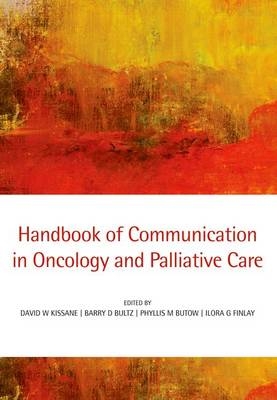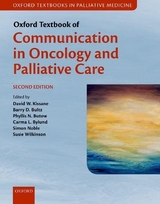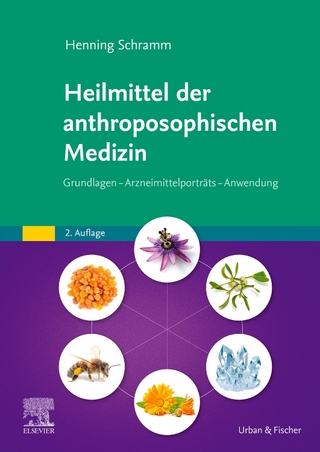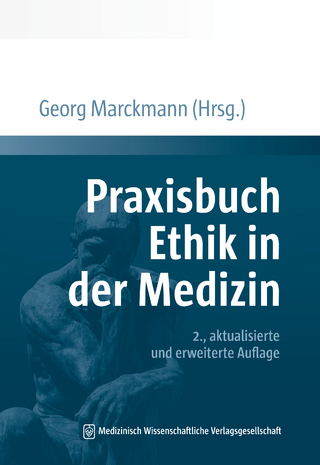
Handbook of Communication in Oncology and Palliative Care
Oxford University Press (Verlag)
978-0-19-923837-8 (ISBN)
- Titel ist leider vergriffen;
keine Neuauflage - Artikel merken
This comprehensive text provides clinicians with practical and evidence-based guidelines to achieve effective, patient-centered communication in the areas of cancer and palliative care. Written by an outstanding panel of international experts, it integrates empirical findings with clinical wisdom, draws on historical approaches and presents a state-of-the-art curriculum for applied communication skills training for the specialist oncologist, surgeon, nurse and other multi-disciplinary team members involved in cancer care today. In this book communication is broken down into key modules that cover the life-cycle of cancer care. They include coverage of diagnosis and treatment including clinical trials, empathic support in response to distress, transition to survivorship or palliative therapies, discussion of prognosis, conduct of family meetings, and care of the dying. Complementary training of patients in their communication with the doctor completes the interactive dyad. The art of teaching, impact of gender and power in the consultation and the ethical context are carefully considered.
Special communication challenges include discussion of genetic risk, rehabilitative and salvage surgery, promotion of treatment adherence, unanticipated adverse outcomes, intercultural issues, fertility and sexuality. The value of decision aides, question prompt lists, audio-recording of consultations and use of the internet is illustrated. By looking across the full spectrum of disciplines involved in the multidisciplinary team, discipline-specific issues are considered by experts in each field. In this manner, the needs of patients and their relatives are evaluated, including paediatric and geriatric populations. To achieve all of this, theoretical models are examined from the medical school to the highly specialized practice, facilitation training and actor training are made explicit, and international approaches to communication skills training are compared and contrasted. Finally, research tools that assist in coding cancer consultations, evaluating training courses, and employing mixed methods in studies aid the reader in providing clear and sensitive communication when handling challenging situations whilst treating cancer sufferers and palliative care patients.
Ilora Finlay is a Consultant in Palliative Medicine and chronic pain at the Velindre NHS Trust, Cardiff. She is also an honorary Professor and was Vice Dean of the School of Medicine 2000-2005. Professor Finlay currently chairs the Palliative Care Strategy Implementation Board for the Welsh Assembly Government. She has published over 126 papers and seven books and holds senior editorial positions for medical journals such as Lancet Oncology and the Journal of Evaluation in Clinical Practice. In 1996, Baroness Finlay was named Welsh Woman of the Year in recognition for her work in the field of palliative care. In 2001, she was appointed a people's peer in the first open contest for membership of the House of Lords. In establishing the Diploma/MSc in Palliative Medicine (Cardiff University), she has trained hundreds of general practitioners in communication skills through experiential residential programmes, developing teaching tools and assessment methods.
SECTION A: INTRODUCTION TO COMMUNICATION STUDIES IN CANCER AND PALLIATIVE MEDICINE ; 1. The history of communications skills knowledge and training ; 2. The art of teaching communication skills ; 3. Theoretical models of communication skill training ; 4. Shared treatment decision-making and the use of decision aids ; 5. The ethics of communication in cancer and palliative care ; 6. Gender, power and nonverbal communication ; 7. Medical student training in communication skills ; 8. Overview of interventions to enhance cancer patients' participation in medical consultations ; SECTION B: A CORE CURRICULUM FOR COMMUNICATION SKILLS TRAINING FOR ONCOLOGY AND PALLIATIVE CARE ; 9. Breaking bad news ; 10. Discussing prognosis and communicating risk ; 11. Communication training to achieve shared treatment decisions ; 12. Responding to difficult emotions ; 13. Denial and communication ; 14. Communicating with relatives/companions about cancer care ; 15. Conducting a family meeting ; 16. Communication about coping as a survivor ; 17. Dealing with cancer recurrence ; 18. Communication about transitioning patients to palliative care ; 19. End-of-life communication training ; SECTION C: A SPECIALTY CURRICULUM FOR ONCOLOGY ; 20. Enrolment in clinical trials ; 21. Working as a multidisciplinary team ; 22. Communicating genetic risk ; 23. Rehabilitative and salvage surgery ; 24. Discussing unproven therapies ; 25. The effect of internet use on the doctor-cancer patient relationship ; 26. Promoting treatment adherence ; 27. Communication strategies and skills for optimum pain control ; 28. Discussing adverse outcomes with patients ; 29. Clinical perspectives on shared decision-making ; 30. Audio-recording important consultations for patients and their familities - putting evidence into practice ; 31. Working with interpreters and achieving culturally competent communication ; 32. Challenges in communicating with ethnically diverse populations ; 33. Intercultural communication in palliative care ; 34. Communicating about infertility risks ; 35. Communicating about sexuality in cancer care ; SECTION D: COMMUNICATION ISSUES ACROSS THE DISCIPLINES ; 36. The challenges and rewards of communication skills training for oncology and palliative care nurses in the United Kingdom ; 37. Ambulatory nurses responding to depression ; 38. Social work support in crisis ; 39. Communication in radiology ; 40. Communication in surgical oncology ; 41. Communication in non-surgical oncology ; 42. Palliative medicine: communication to promote life near the end-of-life ; 43. Communication issues in pastoral care and chaplaincy ; 44. Communication in oncology pharmacy: the challenge of the treatment adherence ; 45. Psychosocial program development ; 46. Communication challenges with the elderly ; 47. Issues for cognitively impaired elderly patients ; 48. Communicating with children when a parent is dying ; 49. Creative arts in oncology ; SECTION E: EDUCATION AND TRAINING ; 50. Learner-centered communication ; 51. Facilitating skills practice in communication role play sessions: essential elements and training facilitators ; 52. The role of the actor in medical education ; 53. Training patients to reach their communication goals: a concordance perspective ; SECTION F: INTERNATIONAL INITIATIVES IN COMMUNICATION TRAINING ; 54. The OncoTalk model ; 55. The Swiss model ; 56. The Australian model ; 57. The United Kingdom general practitioner and pallaitve care model ; 58. Communication skills training and research: the Brussels experience ; SECTION G: RESEARCH IN CANCER COMMUNICATION ; 59. Evaluating communication skills training courses ; 60. Qualitative approaches to clinician-patient communication ; 61. Doctor-patient communication interaction analysis systems ; 62. The Roter Interaction Analysis System (RIAS): applicability within the context of cancer and palliative care
| Erscheint lt. Verlag | 7.4.2011 |
|---|---|
| Zusatzinfo | 19 black-and-white line drawings and 2 halftones |
| Verlagsort | Oxford |
| Sprache | englisch |
| Maße | 176 x 245 mm |
| Gewicht | 1337 g |
| Einbandart | kartoniert |
| Themenwelt | Medizin / Pharmazie ► Medizinische Fachgebiete ► Medizinethik |
| Medizin / Pharmazie ► Medizinische Fachgebiete ► Onkologie | |
| Medizin / Pharmazie ► Medizinische Fachgebiete ► Palliativmedizin | |
| ISBN-10 | 0-19-923837-5 / 0199238375 |
| ISBN-13 | 978-0-19-923837-8 / 9780199238378 |
| Zustand | Neuware |
| Informationen gemäß Produktsicherheitsverordnung (GPSR) | |
| Haben Sie eine Frage zum Produkt? |
aus dem Bereich



